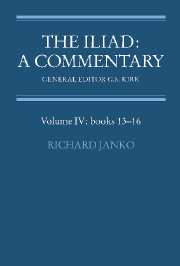2 - The origins and evolution of the epic diction
Published online by Cambridge University Press: 05 June 2012
Summary
The artificial diction of the Homeric poems (‘Kunstsprache’) is in essence identical to that of the other poems in the same tradition of oral narrative song in hexameters, i.e. the remnants of the Epic Cycle, the Hesiodic poems and ‘Homeric’ Hymns, which extend well into the sixth century. Linguistic differences between these poems are barely discernible save by subtle statistical tests; the striking fact of the tradition's unity constitutes an impressive testimony to its panhellenic appeal and to the pre-eminence of that Ionic branch of it represented by Homer. Brief hexameter inscriptions from continental Greece have been held to show that local poets maintained epic traditions in local dialect, but this is doubtful. Some local influence is visible in Hesiod, e.g. in the Attic formula λαμπράν τε σελήνην; but his diction is largely identical to Homer's, and he is fully heir to the Ionian epic tradition. Greek genres tended to adopt different regional styles of speech, according to where the finest practitioners of each originated. From Homer onward, wherever epic poets came from, they used the same basically Ionic diction, containing forms derived from different times and dialects, or from no time or place at all, but invented.
The artificial nature of the epic diction
This diction was never spoken anywhere, only sung; its origins were for centuries an insoluble puzzle. Aristarchus deemed it an archaic form of Ionic, spoken by the Ionians' ancestors before they left Attica (13.195–7n.).
- Type
- Chapter
- Information
- The Iliad: A Commentary , pp. 8 - 19Publisher: Cambridge University PressPrint publication year: 1991
- 1
- Cited by

